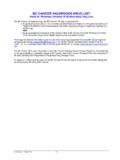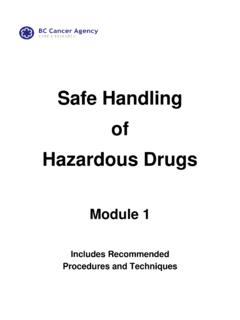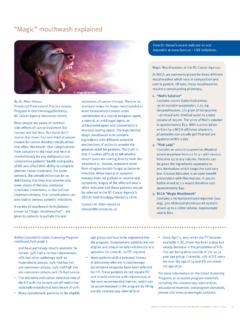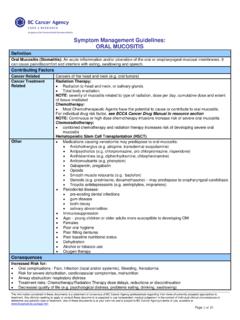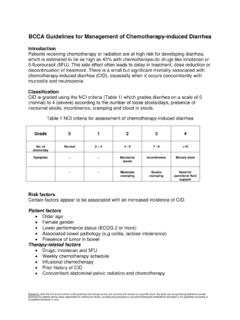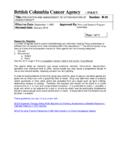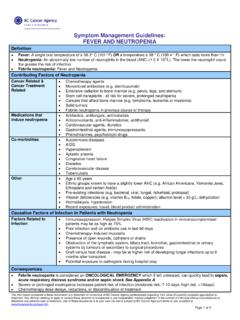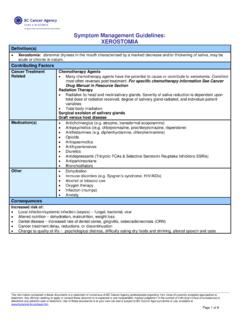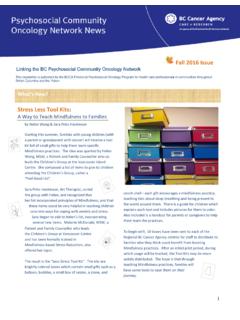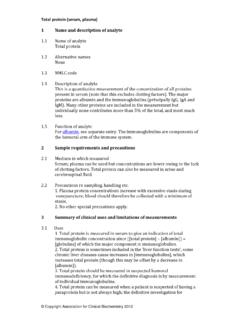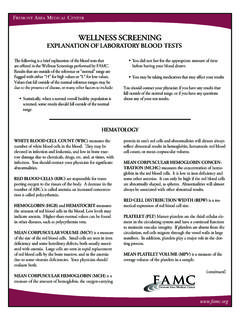Transcription of BC Cancer Protocol Summary for Treatment of Relapsed ...
1 BC Cancer Protocol Summary for Treatment of Relapsed / refractory chronic lymphocytic leukemia or Small lymphocytic Lymphoma Using iBRUtinib Protocol Code ULYIBRU. Tumour Group Lymphoma Contact Physician Dr. Laurie Sehn ELIGIBILITY: chronic lymphocytic leukemia or small lymphocytic lymphoma with or without chromosome 17 p deletion, who have received at least one prior therapy and are considered inappropriate for Treatment or retreatment with a fludarabine-based regimen including short progression-free interval after previous Treatment *. AST or ALT less than 3 x ULN.
2 A Compassionate Access Program (CAP) approval is required prior to the initiation of Treatment (please refer to ). * Patients are eligible to receive either idelalisib with riTUXimab (ULYIDELAR) OR iBRUtinib (ULYIBRU). in the Relapsed / refractory setting. ULYIDELAR is not funded as a sequential Treatment option for patients who have progressed on iBRUtinib, except as a bridge to allogeneic transplant in patients who have received first-line iBRUtinib for 17p deletion (ULYFIBRU) or high risk disease. TESTS: Baseline (required before first Treatment ): CBC & diff, platelets, creatinine, bilirubin, ALT, PTT, INR.
3 Baseline (required, but results do not have to be available to proceed with first Treatment ; results must be checked before proceeding with cycle 2): HBsAg, HBcoreAb Each time seen by physician: CBC & diff, bilirubin, ALT. If clinically indicated: creatinine. PT, PTT, INR, ECG. PREMEDICATIONS: None SUPPORTIVE MEDICATIONS: If HBsAg or HBcoreAb positive, start lamiVUDine 100 mg/day PO for the duration of chemotherapy and for six months afterwards. Treatment : Drug Dose BC Cancer Administration Guideline iBRUtinib 420 mg daily PO. Continuously until disease progression or unacceptable toxicity BC Cancer Protocol Summary ULYIBRU Page 1 of 3.
4 Activated: 1 Dec 2015 Revised: 1 Feb 2018 (PT removed from baseline lab). Warning: The information contained in these documents are a statement of consensus of BC Cancer professionals regarding their views of currently accepted approaches to Treatment . Any clinician seeking to apply or consult these documents is expected to use independent medical judgement in the context of individual clinical circumstances to determine any patient's care or Treatment . Use of these documents is at your own risk and is subject to BC Cancer 's terms of use available at DOSE MODIFICATIONS: Toxicity occurrence CLL dose modification after recovery 1st Restart at 420 mg daily nd 2 Restart at 280 mg daily 3rd Restart at 140 mg daily 4th Discontinue 1.
5 Myelosuppression: Toxicity iBRUtinib dose 9. *Neutropenia Grade 4 (ANC less than x 10 /L) Hold until ANC greater than or equal to 1, restart at 9. or Grade 3 neutropenia (ANC x 10 /L) dose indicated above associated with an infection or fever C. *Grade 4 thrombocytopenia (platelets less than 25 Hold until platelets greater than or equal to 50. 9 9. x 10 /L) or Grade 3 (platelets less than 50 x 10 /L) restart at dose indicated above with bleeding Nonhematological toxicity greater than or equal to Hold until improvement to grade 1 toxicity or Grade 3 baseline, restart at dose indicated above *No dose reduction if decreased counts are due to disease 2.
6 Hepatic Impairment: Hepatic impairment Recommended dose Mild (Child-Pugh Class A) 140 mg PO daily; monitor patient for signs of toxicity Moderate or severe (Child- not recommended; hepatic impairment is associated with Pugh Class B or C) coagulopathy and may increase the risk of bleeding 3. Renal impairment: No adjustment recommended in mild or moderate renal impairment; no information found for severe renal impairment BC Cancer Protocol Summary ULYIBRU Page 2 of 3. Activated: 1 Dec 2015 Revised: 1 Feb 2018 (PT removed from baseline lab). Warning: The information contained in these documents are a statement of consensus of BC Cancer professionals regarding their views of currently accepted approaches to Treatment .
7 Any clinician seeking to apply or consult these documents is expected to use independent medical judgement in the context of individual clinical circumstances to determine any patient's care or Treatment . Use of these documents is at your own risk and is subject to BC Cancer 's terms of use available at PRECAUTIONS: 1. Neutropenia: Fever or other evidence of infection must be assessed promptly and treated aggressively. 2. Hyperuricemia and tumour lysis syndrome: Patients at risk of tumour lysis syndrome should have appropriate prophylaxis and be monitored closely.
8 See BC Cancer Drug Manual iBRUtinib Drug Monograph for more information. 3. Hemorrhagic events: Minor hemorrhagic events including bruising, epistaxis and petechiae occur in approximately half of the patients treated with iBRUtinib. Major hemorrhagic events including subdural hematoma, gastrointestinal bleeding, hematuria and post-procedural bleeding occur in 3% of patients. Use with caution in patients taking anticoagulants or medications that inhibit platelet function. Hold Treatment for 3-7 days pre- and post-surgery; reinitiate post-surgery based on the risk of bleeding.
9 4. CYP3A4 substrate: Concomitant therapy with strong or moderate CYP 3A inhibitors may increase iBRUtinib exposure; avoid if possible. Concomitant use of iBRUtinib with strong CYP 3A inducer may decrease iBRUtinib exposure; avoid if possible. 5. Elderly Patients: patients over 65 yrs of age experience more cardiac events (atrial fibrillation, hypertension), infection (pneumonia, cellulitus), gastrointestinal events (diarrhea, dehydration), as well as a higher frequency of grade 3 or greater adverse effects. 6. Persistent atrial fibrillation: ECG is recommended in patients who develop arrhythmic symptoms including palpitations and lightheadedness or a new onset of dyspnea.
10 If atrial fibrillation persists, evaluate the risk vs. benefit of continuing Treatment and consider a dose reduction. 7. Lymphocytosis: Has been reported, usually occurring within the first few weeks of therapy and resolving by 8-23 weeks. Possibly related to the inhibition of BTK-mediated cellular homing and adhesion. 8. Hepatitis B Reactivation: All lymphoma patients should be tested for both HBsAg and HBcAb. If either test is positive, such patients should be treated with lamiVUDine during chemotherapy and for six months afterwards. Such patients should also be monitored with frequent liver function tests and hepatitis B virus DNA at least every two months.

